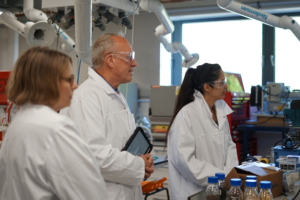Addressing the need for renewable energy
The climate crisis continues to be a matter of both national and international importance. In recognition of this importance, the Midlands Innovation partner universities made a bid to Innovate UK to invest in energy research in the Midlands.
Formed in 2016, ERA initially received £60 million before later receiving an additional £120 million from investors, with the funding strategically allocated amongst the partners. The impact of this funding is ongoing, boosting the reputation of energy innovation in the Midlands.
Re-energising industry in the Midlands
Built on the site of Webster and Horsfall, a long-established Birmingham wire-making business, the Tyseley Energy Park (TEP) exemplifies industrial innovation in the region. Most of the Webster and Horsfall site is now repurposed to house, promote, and develop renewable, clean energy sources such as hydrogen and biomass.
Through its partner the University of Birmingham, ERA provided funding to TEP to install a revolutionary Thermo-Catalytic Reformer (TCR) at the site. ERA’s investment in the TCR has been the catalyst for additional funding, investment and collaboration at TEP in the following years.
Following this investment, TEP has a long-established relationship with MI partner, University of Birmingham. In 2021, the University invested £2.5m to build the Birmingham Energy Innovation Centre (BEIC) on site. This collaboration has resulted in a strategic partnership between TEP, University of Birmingham, and Birmingham City Council.
The outcome of investment
ERA’s investment into TEP was the catalyst for a wide range of exciting outcomes, including:
- Hydrogen energy: TEP houses the UK’s largest green hydrogen production and refuelling facility. It produces up to 1 tonne of hydrogen a day and provides zero-carbon hydrogen to local City Council buses and refuse collection lorries.
- The Birmingham Energy Innovation Centre: The University of Birmingham has invested £8.5m into the development of the Birmingham Energy Innovation Centre. The BEIC focuses on hydrogen and fuel cells, energy storage, magnet and battery recycling and converting waste to fuels and energy.
- Biomass energy: TEP’s thermo-catalytic reforming (TCR) demonstrator can process 80kg of waste per hour; the process converts animal and plant waste into biomass energy, which is then converted into renewable energy sources such as bio-oil and syngas.
- Sustainability in action: The green energy generated from TEP is used by the site-owners and its tenants to power their manufacturing and business operations.
- Ongoing innovations: TEP will also be the home of the new £20m National Centre for Decarbonisation of Heat. The NCDH was awarded the funding through the Department for Levelling Up, Housing and Communities.
The scope and impact of these ongoing innovations highlights the power of regional investment. Sparked by ERA’s initial funding, TEP continues to pioneer solutions in renewable heat and power, from research and development to practical demonstrations of sustainability in action.






